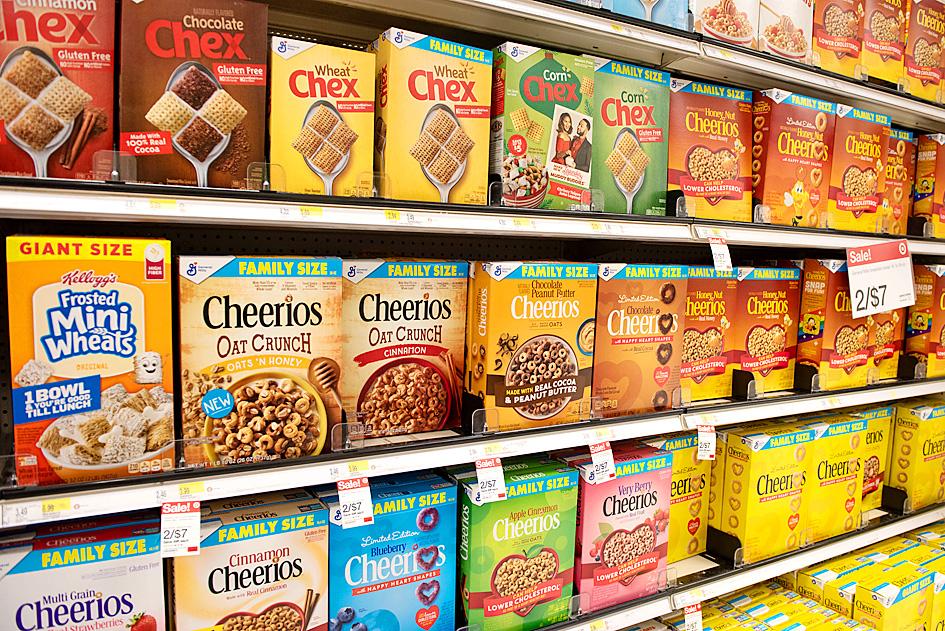A drought struck North America’s oat fields this season, and farmers are harvesting such a small crop that prices have risen to record highs, signaling inflation for breakfast staples such as oatmeal and trendy alternative milk.
Severe hot and dry weather probably slashed oat production by nearly half to an 11-year low in Canada, the world’s biggest exporter. Similarly in the US, one of the world’s top consumers of the grain, the harvest is expected to be the smallest ever. The result is all-time high costs that are likely to filter down to consumers.
The situation for North American farmers was so dire in summer that many cut their losses and harvested damaged plants to be sold as feed for animals. That means even less is available for making popular foods such as granola bars and Cheerios, the No. 1 cold cereal in the US.

Photo: Bloomberg
“You can’t make a Cheerio out of barley,” said Randy Strychar, president of Ag Commodity Research and Oatinformation.com.
While major food companies have not announced price increases related to oat products yet, the higher costs for the grain can only add to the food inflation that has been rampant this year.
Global food prices recently touched a decade high, according to a UN index, while oat futures on Friday climbed as much as 2.1 percent to reach a record of US$6.36 a bushel.
The oat has a humble history as a staid breakfast choice in the form of oatmeal or cereal, but more recently it has become a trendy darling of millennials.
Food companies targeting younger, affluent consumers are billing it as an accessible superfood. Environmentalists tout it as a key crop for reducing carbon emissions in agriculture.
It has shaken up the market for alternative dairy products, with US oat milk sales rising nearly 70-fold since 2017. It now accounts for 16 percent of non-dairy milk sales, more than soy, rice and coconut milk combined, and second only to almond milk, NielsenIQ data showed.
To ensure supplies, oat-milk maker Oatly Group AB scoured the globe for reserves, and has netted contracts in the Baltics and other countries, in addition to Canada. It is enough for the Sweden-based company to increase production and sales over the next year as planned, which helps offset the higher oat prices.
Oat costs account for less than 10 percent of global retail sales, the company said in a statement.
In August, Oatly projected revenue would surge 64 percent this year.
The company would not comment on pricing.
As for Cheerios cereal — which, coincidentally, is celebrating its 80th anniversary this year by using its original name, CheeriOats — General Mills Inc was able to secure enough North American oats to maintain volume of its ultra-important brand, thanks to its scale and “longstanding relationships,” said Jon Nudi, president of North American retail at the company.
“Oats are a really important ingredient for us, Cheerios is our biggest brand in the cereal category,” Nudi said.
While, like other packaged food makers, General Mills has raised prices across categories, Nudi did not commit to raising prices on Cheerios in particular, saying that oat costs are just one piece of overall inflation.
While giants such as General Mills and Oatly were able to get their oats, there is not a lot to go around.
Joe Ennen, chief executive officer of SunOpta inc, a major supplier of oat milk, in a statement likened the “challenging” supply environment to the shortage of computer chips that has been throwing the electronics and automobile industries into turmoil.
Food companies are scrambling for supplies, and Canadian exports would be down sharply this year, said Chuck Penner, president of LeftField Commodity Research in Winnipeg, Manitoba.
Normally when prices shoot up for a commodity, it incentivizes farmers to grow more the following season and relieve supply shortfalls, but there is no guarantee that will happen for oats.
The drought has hurt many other crops, so there is competition, said Lawrence Klusa, president of Winnipeg-based advisory firm Seges Markets.
Canola, flax, lentils, durum wheat and mustard are also fetching steep prices and more could be planted next year instead of oats.
“Everyone is trying to get their needs covered before the oats run out,” Penner said. “It’s a bit of a panic situation right now.”
Other commodities:
‧Gold for December delivery fell US$1.80 to US$1,757.40 an ounce, down 0.06 percent from a week earlier.
‧Silver for December delivery rose US$0.05 to US$22.71 an ounce, up 0.75 percent weekly, while December copper rose US$0.04 to US$4.28 a pound, rising 2.15 percent on the week.
Comments will be moderated. Keep comments relevant to the article. Remarks containing abusive and obscene language, personal attacks of any kind or promotion will be removed and the user banned. Final decision will be at the discretion of the Taipei Times.
"oat" - Google News
October 09, 2021 at 11:00PM
https://ift.tt/3lqCxsH
Severe drought signals inflation for oat-based staples - Taipei Times
"oat" - Google News
https://ift.tt/2VUZxDm
https://ift.tt/3aVzfVV
Bagikan Berita Ini














0 Response to "Severe drought signals inflation for oat-based staples - Taipei Times"
Post a Comment